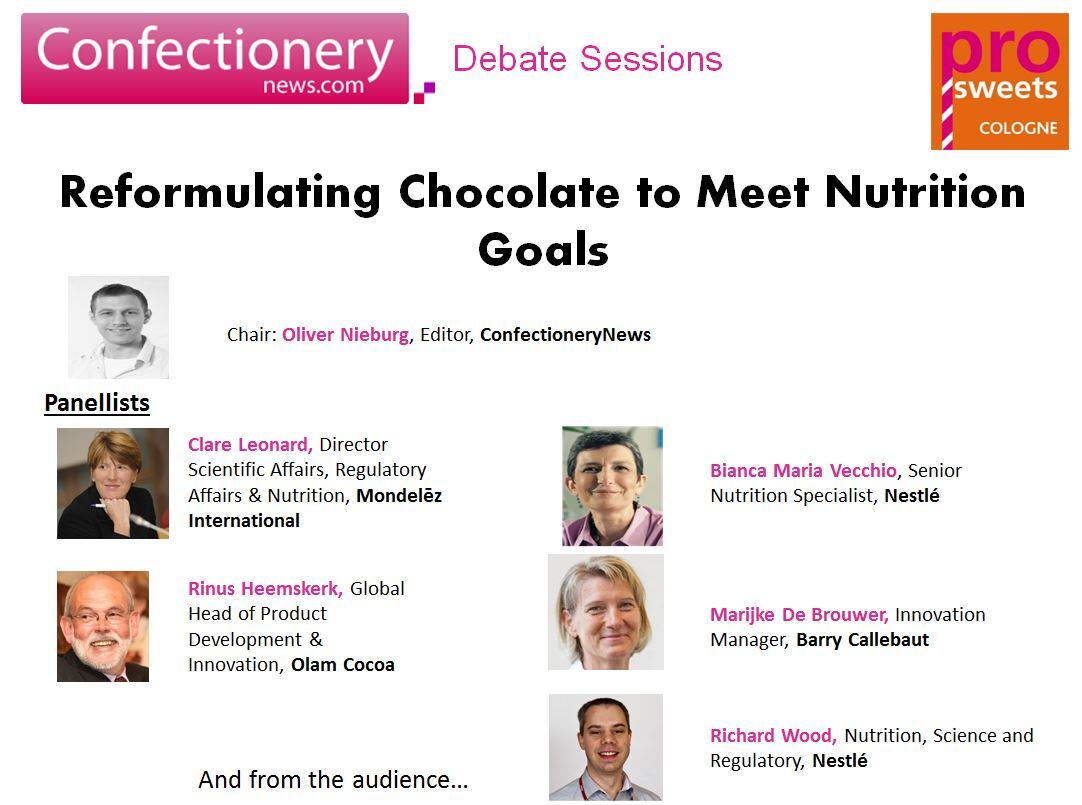It comes as regulators are cracking down on foods high in sugar and saturated fats across the globe.
The live debate ‘Reformulating chocolate to meet nutrition goals’, hosted by ConfectioneryNews, takes place on Tuesday February 2 from 10:30 to 12:00 at ProSweets speakers’ corner in Cologne, Germany.
The session is free for all visitors to ISM, the finished goods fair that takes place parallel to suppliers’ show ProSweets. Add to your calendar
Rising reduced sugar launches
According to Mintel, chocolate launches in Europe, Middle East and Asia with a low, no or reduced sugar claim rose 40% from 2013 to 2014.
Examples at this year’s ISM include ‘GooodBeanz - RAW Fine Flavor Cacao Beans – Stevia‘ by Belgium-based The Good Chocolate Company; and German-based firm Frankonia‘s new sugar-reduced praline assortment Meine Pralinen.

Other companies have set goals to improve the nutritional profile of chocolate products.
Self-imposed nutrition guidelines
Mondelēz established its global ‘Call for Well-being’ strategy in 2014, setting a target to cut saturated fat and sodium across its portfolio by 10% by 2020. It also hopes a quarter of its revenues will come from ‘Better Choices’ products by 2020.
Another global giant, Nestlé has been reformulating its product range, including chocolate, to meet strict thresholds per serving on calories, sodium, added sugars, fructose, trans fatty acids, and saturated fatty acids.
The panel will review how the industry’s biggest players established guidelines in the face copious nutrition guidance from national legislators, the World Health Organization and bodies such as the European Food Safety Authority (EFSA).
R&D experts from Olam Cocoa and Barry Callebaut will also assess the technical possibilities and barriers to reformulation.
Regulatory review
The live debate comes as new dietary guidelines for Americans released this month cut the recommended max daily intake of added sugars from 25% to 10%.
Why attend?
Retailers – Discover how top manufacturers approach reformulating big brands and assess the potential impact on sales
Manufacturers –Learn how top manufacturers set nutrition guidelines and review the technical solutions and barriers to reformulation.
WHO also recently revised its guidelines to add a voluntary proviso that said states would see additional health benefits by setting maximum free sugar intake at 5% of calories per day
In a report released this week, the WHO also called for a tax on sugar-sweetened beverages. It added: “Some countries may consider taxes on other unhealthy foods, such as those high in fats and sugar”.
It also advised national governments to develop compulsory recommendations on marketing foods and drinks to limit consumption of products high in fat, sugar and salt by infants and young children.
Its report says: “There is unequivocal evidence that the marketing of unhealthy foods and sugar-sweetened beverages is related to childhood obesity.”
Our panel
The panel will discuss how companies can navigate the minefield of nutrition regulation to decide how best to reduce sugar, fat and calories.
Do they doubt the science? Do solutions lie in reducing portion sizes, or in alternative fats or sweeteners?
How will the cost of these changes impact sales and profit margins? These questions will be answered by our panelists:

